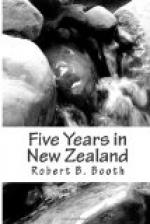This was a very severe winter, and as the snow began to lie heavily I was perforce obliged to stop work for a month or two, and for that time I accepted an invitation from Cook and Brabazon to keep them company at Mesopotamia. Butler had left for Christchurch, where he would remain for an indefinite time.
CHAPTER XV.
WINTER UNDER THE SOUTHERN
ALPS—FROST-BITE—SEEKING SHEEP
IN
THE SNOW—THE
RUNAWAY.
In winter in these high latitudes, such as the Upper Rangitata, lying at the foot and immediately eastward of the great Alpine range behind which the winter sun dipped at 3 o’clock in the afternoon, it was intensely cold, and instances of frost-bite were not uncommon. I recollect a poor young fellow, a bullock-driver on a neighbouring station, getting frost-bitten one night when he had lost his way in the snow. He knew nothing of it until he arrived at the station in the morning, when, on removing his boots his feet felt numb and dead, and no amount of rubbing had any effect in inducing a return of circulation. It soon transpired that his toes were frost-bitten. A messenger was despatched to the Ashburton in hope of finding a doctor, but in vain, and the lad was sent to Christchurch, 150 miles, in a covered dray. This, of course, took a considerable time, and when he arrived gangrene had set in, and both feet had to be amputated above the ankles.
When the snow falls in large quantities it becomes an anxious time for the sheep farmer, and if the flocks are not strong and healthy they are sure to suffer. In snowstorms, the sheep will seek the shelter of some hill or spur, collecting together on the lee side, and here they are sometimes drifted over, when if the snow does not remain beyond a certain period they are mostly safe. As the snow drifts over them the heat of their bodies keeps it melted within a certain area, while the freezing and increase of drift and falling snow continue above and beyond the circle. In this manner a compartment is formed underneath in which the animals live and, to some extent, move about. The existence of these habitations is discovered by the presence of small breathing holes on the surface leading from below like chimneys, and sheep will live in this manner for a fortnight or so. When they have eaten up all the grass and roots available they will feed on their own wool, which they tear off each other’s backs, and chew for the grease contained in it.




